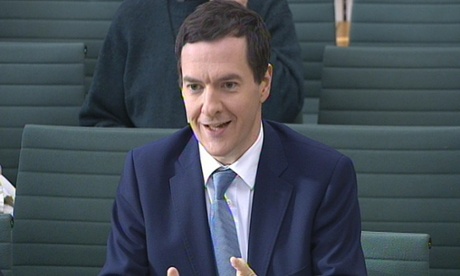
George Osborne’s prospects of stoking the feelgood factor in the run-up to May’s general election received a double boost on Wednesday, with news that living standards are rising and an interest rate rise is likely to be delayed until late 2015 at the earliest.
Mark Carney, the Bank of England’s governor, has repeatedly warned debt-burdened homeowners to brace themselves for higher borrowing costs as the economy continues to recover. But after plunging oil prices dragged inflation down to just 0.5%, the two policymakers on the Bank’s nine-member rate-setting committee who had repeatedly called for a rise have changed their minds.
It now looks almost certain that the coalition government will see out its entire term in office with interest rates unchanged at 0.5% – the lowest level in history.
“It would certainly now be a huge surprise if the Bank of England raised interest rates before the final months of this year,” said City analyst Howard Archer. Any delay will be a relief for consumers who are already struggling to make their mortgage repayments — though it will disappoint savers eking out meagre returns. “In our view, the first hike could be as far away as 2017,” said economists at the City consultancy Fathom.
According to minutes of its January meeting (pdf), the Bank’s monetary policy committee now expects inflation to dip to zero in March, while average wages are increasing at their fastest pace for two years. Official figures published separately showed that with unemployment falling, average pay increased by 1.8% in the year to November, up from 1.6% in October.
With pay growth now outpacing inflation, and expected to continue to do so over the coming months, Labour may face a tougher challenge in making the argument that Britain is locked in a “cost of living crisis”.
Unemployment has continued to decline, falling by 58,000 in the three months to November, according to the office for national statistics. The unemployment rate has dropped to 5.8%, its lowest level for six years, though the pace of improvement in the labour market has slowed.
Chris Williamson, of research group Markit, said: “The data bode well for a revival of consumer spending and household wellbeing in coming months: increasing numbers of people are in paid employment and wage growth is outstripping inflation, meaning incomes are rising, and falling oil prices mean that more of these incomes can be saved or spent on goods and services other than fuel.”
The chancellor seized on the news as evidence that his economic policies are working. Osborne said: “Today’s figures confirm what the IMF said yesterday: despite growing risks in the global economy, Britain is pulling ahead with record numbers in work, falling unemployment and wages rising significantly faster than inflation.
“If we want to carry on making progress towards our goal of full employment then we must continue to work through our long term economic plan – that’s the only way to deliver economic security in an uncertain world economy.”
However, the shadow work and pensions secretary, Rachel Reeves, said: “Today’s fall in overall unemployment is welcome, but wages remain sluggish and working people are £1,600 a year worse off since 2010.”
Unemployment also continued to fall on the narrower, claimant count index, which measures the number of people receiving out-of-work benefits. The claimant count was 823,900 in December, down 24,200 on the month. That figure compares to a fall of almost 40,000 in November.
Martin Weale and Ian McCafferty, the two MPC hawks, who had advocated higher interest rates since last August, conceded that hiking borrowing costs now would increase the risk of deflation — a damaging decline in prices.
John Philpott, of the Jobs Economist consultancy, said an increasing number of vacancies was helping to drive up wages, as employers have to pay more to attract staff. “The most encouraging news in the latest quarterly figures is a rise of 19,000 in the number of job vacancies to a new record level of 700,000. This indicates a modest ongoing tightening of conditions in the labour market which underpins a continued increase in pay growth and a further improvement in real weekly earnings.”
However, youth unemployment actually rose, with the number of 16 – 24 year olds out of work increasing by 10,000, raising concerns that young people may not be benefiting from job creation as the economy picks up.

